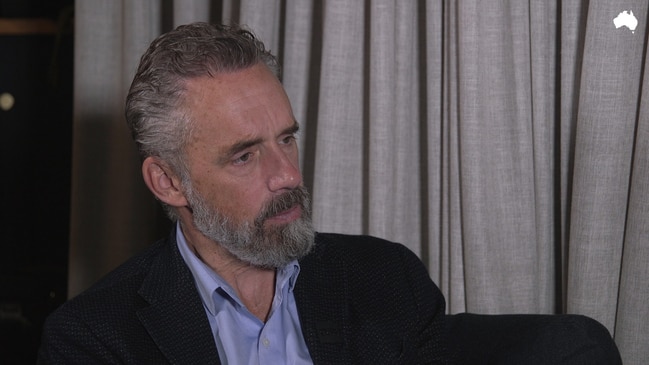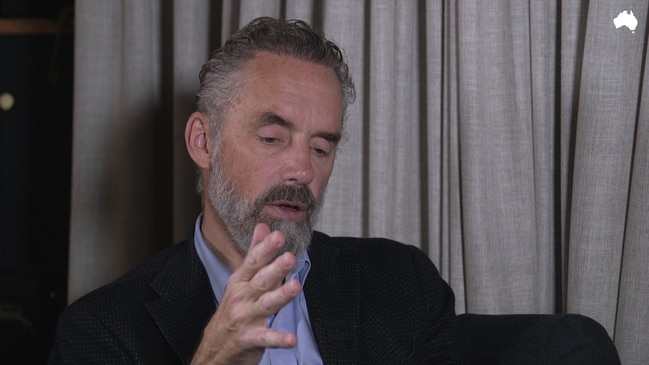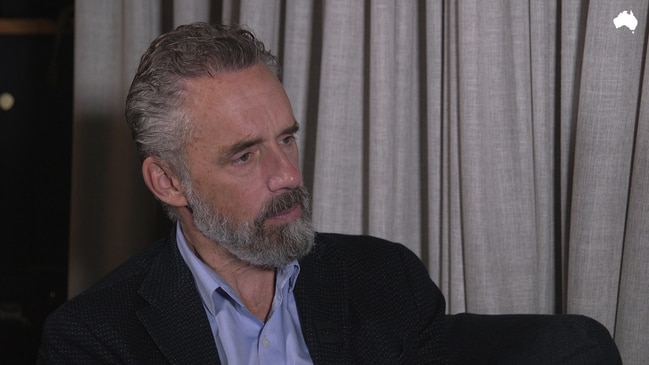Life, romance and relationships, the Jordan Peterson way
The Canadian psychologist talks about the hook-up culture, the sexless marriage and his battle with depression | VIDEO

Jordan Peterson is in town, and it seems like everyone wants to talk about identity politics, gender pronouns, and whether or not there’s a pay gap — but he’s a clinical psychologist.
Seems a shame not to ask him about his practice. To get his thoughts on mental health, and modern relationships?
It’s been almost a year since Peterson was last in town, and he’s lost so much weight on his infamous, all-meat diet that his wedding ring is turning. (He takes this diet seriously, to the point he now carries cold, cooked steaks in a baggie in his pocket, in case he finds himself hungry and somewhere meatless.)
He’s more famous now than he was last time, having sold three million copies of Twelve Rules for Life. His life is one of standing ovations, and of people approaching him shyly in the street, to thank him for saving their lives.
He doesn’t think it’s turned his head, and he’s often moved by “how little encouragement” can turn a person around.
“But it’s been a very two-sided experience, a lot of positive publicity and attention but also a tremendous amount of stress,” Peterson says of the impact of fame on his own equilibrium.
In an hour-long interview, he tackles a range of topics, including the rise of Trump, which he characterises more as the fall of Clinton. (Had Peterson been an American, he says he would have “held his nose and voted for her”.)
He talks about #Metoo, and the conundrum facing women in their thirties, who want both baby and briefcase. “Nobody can have it all,” he says. “My general advice to people is that there aren’t that many fundamental necessities in life. You need a job, you need intimate relationships, and you need family. If you forgo any of those, you pay a huge price.
“You may decide that your career is worth the price. Perhaps it is, but it’s not worth the price very often. You have to be careful. You only have one life, and if you forgo your opportunity, it’s done. And I think it’s a catastrophe for people to forgo the opportunity to spend substantial time with their young children.”
You can see how that kind of thing could quickly become: “Peterson tells women to give up their careers to have kids!”

It’s not what he means — he means, maybe work part-time for a bit — but he can shrug it off, having dealt with issues far more important than trolling, including a decade-long depression battle.
Peterson in his lectures likes to warn people: life is hard, and if you’ve not yet experienced a tragedy, brace yourself, because trouble is coming. In his own life, he says it’s a “toss up between dealing with my daughter’s illness, and the depression that runs through my family”.
“It’s hard to say which was more challenging,” he says. “The depression issue is a decades-long problem. We’ve made a lot of headway. My grandfather, who never received any medication, was basically immobilised by his depression. My father was struck very hard in his fifties. By the time it came to me, additional improvements had been made.
“But depression is a brutal enterprise. For me, in particular, it’s hard on the lecture front, professionally, because it makes it hard to move physically and interferes with the flow of my thoughts.
“There’s a fair bit of intense misery associated with it as well. It’s like severe grief (and) proclivity to tears, that has characterised me since I was young.”
Peterson’s daughter had depression; a severe form of arthritis; and an auto-immune disease that left her with brittle bones. The bone condition was agonising.
“I asked my daughter, who walked on broken legs, who had to take opiates for pain, and wanted to sleep 24 hours a day, if she would rather have the depression or the arthritis,” he says. “She said virtually immediately that she would take the arthritis over the depression any day.”

Peterson says “anxiety and depression” are by far the most common conditions he saw when people came to his clinical practice, but the most frightening patient he saw was a pedophile.
“He was the worst,” he says. “Unbelievably narcissistic, and completely incurable by any known means. It was like nobody existed except him. He had justifications and rationalisations for everything he’d done, not only for why his molestation of his grandchildren was OK, but why it was a positive good. He was quite the piece of work. I’ve had other clients who were malevolent in their own way. Not many. It’s rare. Most people you see clinically have hard lives. That’s why they’re there (because events) are beyond their ability to overcome.”
On modern romance, Peterson says hook-up culture, and apps such as Tinder, are virtually bound to create misery for people.
“We are still under the delusion that we can divorce sex from life,” he says. “You can’t divorce sexuality from emotion. You can’t have sex without entangling yourself, at least to some degree.
“The problem with hook-up culture, with Tinder, let’s say, is it’s predicated on the assumption that people can be partners in a purely physical sexual exchange … first of all that’s an experiment that has never been conducted in the entire human history, very unlikely to go well; and second, it’s predicated on a naive, wilfully blind view of the relationship between people. It doesn’t work.”
The sexless marriage is just as problematic, and painful for people, he says. “You get married, you have kids, you have two careers, it’s very easy for the sexual part of your relationship to settle to 11th place on a 10-item schedule,” he says. “In order to maintain an intimate relationship with sexual energy … well, it takes a lot of work, and people don’t do the work … My sense is, it’s useful if you want to keep your sex life alive, to assume that you’re going to be intimate a minimum of once a week and perhaps twice a week — but you have to agree on that, and you have to make it a priority and perhaps you have to engage in that, with that, really whether you’re in the mood or not, because you’re thinking about the long game, not the short game. Use it or lose it, shall we say?”




